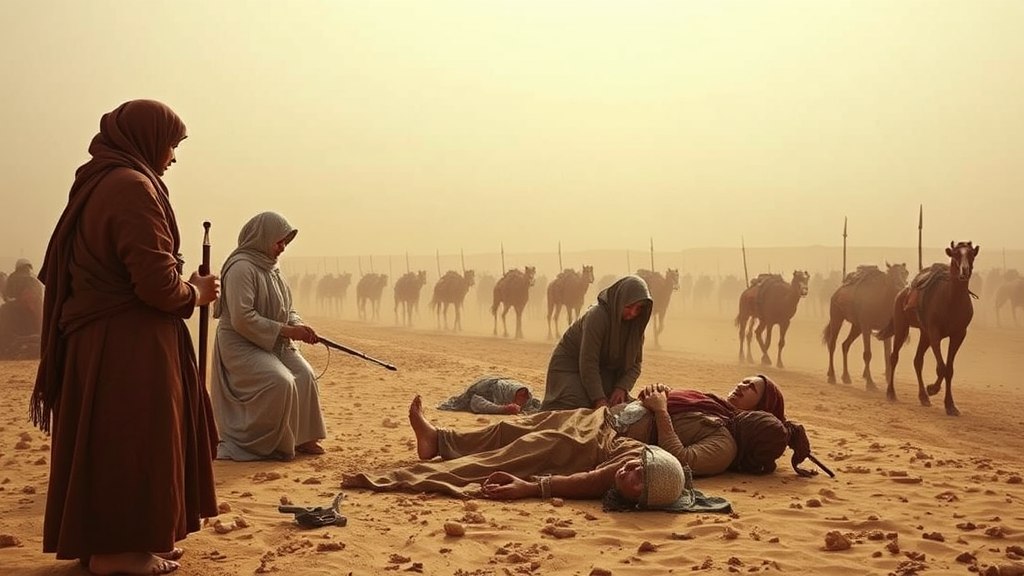In the name of god
In the previous videos, I narrated the story of the first battle of the Muslims against the Quraysh, explaining how the Muslims, with divine assistance, emerged victorious, while the Quraysh returned to Mecca defeated. However, the thought of revenge did not leave the leaders of the Quraysh, and they were planning to retaliate against the Muslims for the defeat they had suffered. Therefore, they prepared an army of three thousand soldiers and arranged for military equipment to facilitate their attack on the Muslims. They even brought women with them to boost the morale and motivation of the soldiers.
This news of the Quraysh's readiness for war reached the Prophet Muhammad through his uncle Abbas, and the Prophet called upon his companions for consultation on how to confront the Quraysh's attack. The young members of the group suggested facing the enemy near the mountains of Uhud, while the elders advised to confront the enemy just a little outside the city. The Prophet agreed with the young men and prepared a thousand soldiers for battle, moving close to the mountains of Uhud.
One individual, who harbored animosity towards the Prophet, expressed his dissatisfaction with the Prophet's decision to heed the young men’s advice. Consequently, he returned to Medina with three hundred men, while the Prophet proceeded to confront the enemy with seven hundred soldiers. The Prophet ordered forty of the warriors to hide behind the mountain with bows and arrows to prevent a surprise attack from the enemy, instructing them to never abandon their position under any circumstances.
The battle began, and the Quraysh sent forth their standard-bearer, a strong man, into the field. After some time, the Quraysh were defeated, and their soldiers fled. Although they had a large number of troops and their standard-bearers were very brave and strong, they sent nine men into the field, all of whom were killed by Imam Ali. This caused fear among the Quraysh and led to a loss of morale, resulting in their retreat and the victory of the Muslims. However, this victory did not last long, as those who were positioned behind the mountain thought the battle was over and descended to collect the war spoils, disobeying their commander’s orders.
One of the commanders of the Quraysh, seeing the mountain empty, launched an attack on the Muslims with two hundred men from behind the mountain. A woman from the Quraysh army raised the flag, signaling the fleeing soldiers to return, and a fierce battle ensued. The Muslims, lacking military uniforms, became disoriented as the wind began to blow against them, leading to confusion and even causing them to attack one another.
With Imam Ali's cleverness, they shouted slogans to recognize each other. However, the rumor of the Prophet's death spread among the Muslim ranks, weakening their morale in the battle. Despite this, Imam Ali fought bravely and defended the Prophet, deflecting enemy blows away from him multiple times. Nevertheless, the Prophet was severely wounded, and Imam Ali himself sustained eighty injuries.

The Muslims suffered a heavy defeat in the Battle of Uhud. After the battle, a group led by Fatimah Zahra came to the field to tend to the wounded soldiers, and about seventy Muslims were killed in the battle. When the defeated Islamic forces returned to Medina, they were mocked by internal enemies known as the hypocrites, and the Jews of Medina rejoiced at their defeat.
However, the Battle of Uhud, despite the defeat, provided valuable lessons for the Muslims, emphasizing that they should never disobey the Prophet's orders and should fight for God, not for war spoils or worldly possessions. They recognized both internal and external enemies.
After the battle, the Muslims were very depressed, and God revealed many verses of the Quran through the Prophet, promising them that if they obeyed God and the Prophet, they would be victorious. He reminded them that they fought in the Battle of Badr for the sake of God, but in the Battle of Uhud, they abandoned their positions for the sake of war spoils.
Despite being wounded, the Prophet pursued the enemy the next day with an army to ensure that the Muslims did not appear weak and that Medina would not be harmed. When he was certain that the enemies had fled, he returned to Medina.
Additionally, the Prophet lost his uncle Hamza in the Battle of Uhud. When Hamza's body lay on the ground, Abu Sufyan's wife, seeking revenge for the Battle of Badr, cut out his liver and ate it. For this reason, she was referred to as Hind the Liver-Eater.
Dear friends, I am Rana, and I narrate the history of Islam in a simple and story-like manner. For religious consultations, you can contact me via WhatsApp.

دیدگاه خود را بنویسید